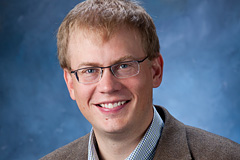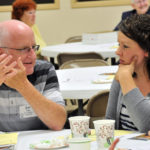By Micah Kiel
The Catholic Messenger
Another article about racism? (Insert eye-roll emoji here.) I feel it, too. However, the “sign of the times” compels us to continue to think about the problem of racism today and how the church ought to respond. In the next few months, faculty members from the theology department at St. Ambrose University in Davenport will do just that: write about racism from the perspective of church theology. Here, in the first of these articles, I will offer a big-picture assessment of what the church teaches about racism and why we ought to care about that teaching.
One reason all Catholics should be concerned about racism is church teaching that refers to the “sign of the times.” This phrase, closely associated with the teachings from the Second Vatican Council, suggests that a life of faith cannot be divorced from the reality around us. Jesus models this idea for us when the plight of the world moved him with pity (see Matthew 9:36).

What are the signs of our time? The rallies and protests from last summer were eye opening for many. They also, whether legitimately or not, became divisive. Let’s look at some data. We need look no further than our current pandemic. According to the CDC, race and ethnicity are risk factors for COVID-19. Native American, African American and Hispanic Americans are approximately four times more likely to be hospitalized from COVID-19. They are three times more likely to die. These risk factors are due to poor underlying health, lack of access to affordable healthcare, and the likelihood that these individuals are the “front-line workers” we hear so much about, putting them directly in harm’s way. This data reveals to us what our world is like: black and brown bodies are treated differently than white ones. It is a fact, a sign of our times.
The church asks us to confront what Father Bryan Massingale calls “unconscious racism.” The fact that non-white people are more likely to die from COVID exemplifies unconscious racism. Nobody wants racial disparities in our society and in our healthcare system, but they exist because of a constellation of structures that result in these outcomes.
So, when the church refers to racism as a sin (see the pastoral letter on racism from the U.S. Catholic bishops in 1979), we need to examine not only explicit racism behaviors, but also the way we are unconsciously complicit in a racist society. The church calls racism a “social sin,” because our society has prioritized one color of skin over another. Racism is not the only problem our society faces, but it is a significant problem and one the church helps us think about.
In Pope Francis’ recent encyclical, Fratelli Tutti, he discusses the “throwaway” culture of our world. A throwaway culture runs counter to the church’s social teachings on issues such as abortion, poverty or worker’s rights.
These teachings are grounded in the fundamental human dignity of each person. Rather than uphold this dignity, our society tends to devalue and discard. In this context, Pope Francis turns explicitly to the problem of racism: “a readiness to discard others finds expression in vicious attitudes that we thought long past, such as racism, which retreats underground only to keep reemerging. Instances of racism continue to shame us, for they show that our supposed social progress is not as real or as definitive as we think” (FT 20). Later in the encyclical, he uses a metaphor we today understand all too well: “Racism is a virus that quickly mutates and, instead of disappearing, goes into hiding, and lurks in waiting” (97).
These are challenging words. It would be easier to ignore them, to pretend as if racism is not a problem. Feigning ignorance should not be the Catholic way. Pope Francis calls attention to the seamless garment of the church’s social teaching, that human dignity is to be elevated in every circumstance, and that racism today is one significant way that dignity is squashed. Therefore, we must work, with God’s help, to vaccinate the world and ourselves against the virus of racism in any way that we can.
(Micah Kiel is a professor of theology at St. Ambrose University in Davenport.)











